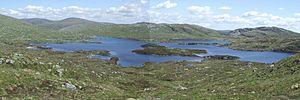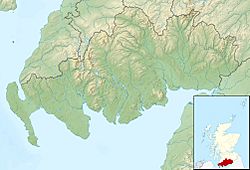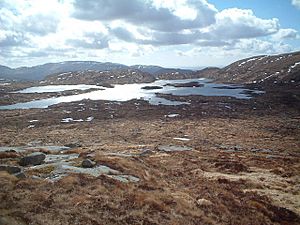Loch Enoch facts for kids
Quick facts for kids Loch Enoch |
|
|---|---|

|
|
| Location | Galloway |
| Coordinates | 55°08′10″N 4°26′20″W / 55.13611°N 4.43889°W |
| Type | Loch |
| Primary outflows | Eglin Lane |
| Catchment area | 186 ha (460 acres) |
| Basin countries | Scotland |
| Surface area | 50 ha (120 acres) |
| Max. depth | ~36 m (118 ft) |
| Surface elevation | 493 m (1,617 ft) |
Loch Enoch is a beautiful freshwater loch (which is a Scottish word for lake). It is located in Galloway, Scotland. The loch sits in a basin made of granite rock. You can find several small islands and sandy beaches along its shores.
Long ago, the sharp granite sand from these beaches was collected. People sold it to sharpen knives and tools like scythes. The land around the loch is mostly covered with Purple Moor Grass and Heather plants. The water flowing out of Loch Enoch helps supply Loch Doon and the River Doon. Both of these are located in Ayrshire.
Loch Enoch's Water Quality History
The water in Loch Enoch has changed over many years. By the 1800s, the water had already become a bit acidic. This meant it was not ideal for some fish.
Fish Population Changes
A book from 1929 described a trout caught in Loch Enoch. It said the fish looked different from others. It was missing parts of its tail and fins. The last trout was caught in 1899. After that, it seemed no more fish lived there.
In the 1940s, the loch became even more acidic. This was due to acid rain from factories. By the 1950s, all the fish had disappeared from the loch.
Efforts to Help the Loch
Things started to get better in the 1970s. The loch stopped becoming more acidic. From the 1980s onwards, the water slowly became less acidic. The pH level, which measures how acidic something is, slowly went up. It changed from about 4.3 in 1978 to 4.9 in 2003. A higher pH means the water is less acidic.
In 1994, people tried to bring fish back to the loch. They put 3,000 trout into the water. This was an effort to help the loch's ecosystem recover.
 | Percy Lavon Julian |
 | Katherine Johnson |
 | George Washington Carver |
 | Annie Easley |



